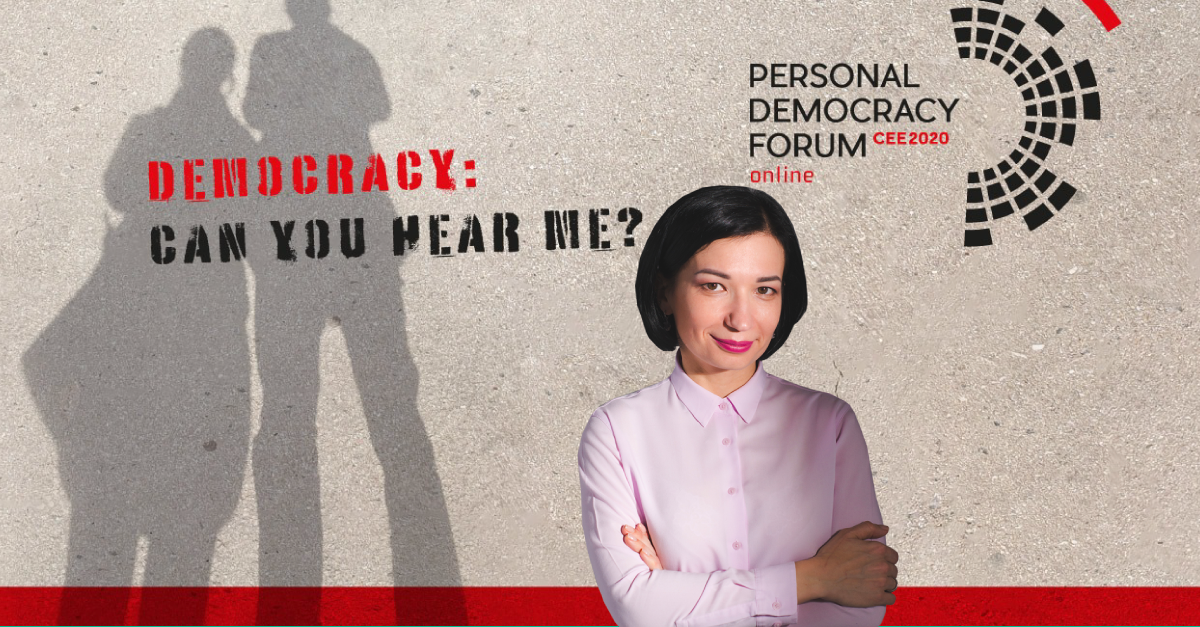Personal Democracy Forum CEE is an annual event for citizen, activist, public officers, and civic tech community. This year it`s held online. During PDF CEE online "Democracy: Can you hear me?" participants discuss the interplay between democracy, technology, and society in the context of COVID -19 pandemic and in the future. There will be activists from 14 European countries and USA, public officers, journalists, 1980's Polish democratic opposition activist, academics as speakers. One of them - chair of Civil Network OPORA board Olha Aivazovska.
Read the full text of her speech:
Good afternoon!
Any governance crisis becomes even more visible in global challenges like COVID-19 pandemic. There is sometimes a gap between effective and democratic governance in a state of emergency or emergency situation. A state of emergency was not imposed in Ukraine, and quarantine rules were regulated mainly by Government decisions based on legislation protecting the civilian population from epidemic disease consequences. Restrictions on rights are sometimes questionable in relation to the imposed measures and ineffective in terms of their observance. Our biggest concern was whether the Parliament will work properly as a branch that realises oversight of the government activities, the law enforcement system, and the balance of power. Parliament did not work in a regular way, but its role had significantly decreased.
Rules for self-isolation, as well as the control of citizens in the country, were so harsh and effective for such a short period, that they became more of a joke topic than a real problem. Ukrainians were given a very short period to return from abroad. This caused scandals and mass complaints about the statements of authorities concerning non-admission of citizens into their own country from abroad if they do not return on time. EU countries have a big demand for various contractors from Ukraine and organize charters to transfer them, but the Ministry of Foreign Affairs and the Government want to introduce a permit to leave. Such demands would bring us back behind the iron wall and into the Soviet times.
The national local elections in October, which fate is finally clear, complete not only the next cycle of governance at self-government level but also the decentralization reform and administrative-territorial reform. There are still many challenges for organization of a democratic process, fair and free elections, in the context of financial crisis and pandemic. It is necessary to find a balance between safety and convenience, as the Ministry of Digital Transformation is developing tools for online voting. Organizations, competent in election matters, are either not involved, or do not believe in an idea of a fast and safe shift from voting on paper at polls to a simple application with a questionable security level. Unfortunately, the stakeholders only discuss this matter online and do not work on solutions to the problem. As the impact of social networks grows, the issue of disinformation and propaganda on the topic of Donbas, COVID-19, and political processes, is not resolved.
Operation of courts and administrative service centers is limited. Thus, citizens have difficulties in solving both ongoing and urgent problems.
Ukraine's problems are hardly unique in this story. However, there is still a question, whether the restriction on freedom of movement, the right to work, and good health care, was realised in an efficient way. Although the coronavirus statistics is optimistic at the first sight, the numbers seem to be far from reality. Ukraine has one of the lowest number of tests compared to other countries in Europe. As of May 13, Ukraine made under 200,000 tests, and fewer than 17,000 of them were positive. Less than 500 persons had died. I am happy that Ukrainians have strong immunity and the will to live, but the dynamics of mortality and morbidity are strange. The right to know the truth can save lives in the context of global challenges, as it does not allow to treat serious threats childishly or frivolously. Thank you for your attention. Stay strong and healthy!
You can also watch PDF CEE online "Democracy: Can you hear me?":
